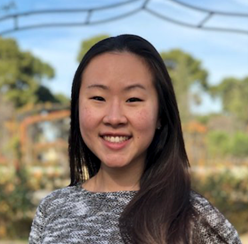Find a CBT Therapist
Search through our directory of local clinicians.
Shirley B. Wang

Mentor Spotlight
ABCT’s Spotlight on a Mentor program aims to highlight the diversity of excellent research mentors within the organization’s membership ranks. Our goal is to spotlight both promising and accomplished mentors across all levels of academic rank, area of specialization, and type of institution.
Shirley B. Wang (she/her/hers) is a 5th year PhD candidate in clinical psychology with a secondary in computational science and engineering at Harvard University. She has been funded by the National Science Foundation Graduate Research Fellowship and the National Institutes of Health F31/NRSA Predoctoral Fellowship. Shirley conducts computational clinical science research to advance our understanding of why people engage in behaviors that are harmful to themselves, including eating disorder behaviors, nonsuicidal self-injury, and suicide. She is particularly interested in mathematical modeling of these phenomena as dynamic systems.
Shirley has published over 40 scientific papers and book chapters and developed an R package for taxometric analysis available on CRAN. Her work has been recognized through several awards, including the 2020 Society for a Science of Clinical Psychology Outstanding Student Researcher Award and the 2018 APA Early Graduate Student Researcher Award. She serves on the editorial boards of International Journal of Eating Disorders, Eating Disorders: Journal of Treatment and Prevention, and Eating and Weight Disorders. Shirley is passionate about mentorship and finds immense joy in working with research assistants and supervising senior thesis projects. She strongly values diversity, inclusion, and belonging, and is committed to promoting these values in mentorship, research, academia, clinical practice, and beyond.
On mentoring: I care deeply about mentorship and providing students and research assistants with opportunities to get hands-on experience with research. Working with students is one of the most rewarding aspects of academia. There’s nothing better than helping someone to develop, execute, and disseminate their own research projects!
My mentorship style is strongly influenced by many amazing mentors I’ve had at all career stages. My undergraduate mentors, Ashley Borders and John Ruscio, invested an incredible amount of time introducing me to clinical and quantitative psychology research. They showed me the importance of making time for dedicated mentorship at early stages of training. At the end of college, I had the immense fortune to be paired (via an early career mentorship program) with Annie Haynos, who was instrumental in helping me apply for PhD programs and fellowships. As a first-year grad student, I shared an office with the brilliant Kathryn Fox, who quickly became a close friend and advanced grad student mentor. Both Annie and Kathryn immersed me in many research projects, looped me into new collaborations, and showed me that good mentorship and collaboration requires genuine caring and kindness, alongside deep, careful, and critical engagement with ideas. As a grad student, I’ve been immensely lucky to be mentored by Matthew Nock, as well as Jennifer Thomas and Kamryn Eddy – all visionaries leading the fields of suicide and eating disorders research, who are constant sources of inspiration and support. I’m also indebted to many other mentors, including Carlos Grilo, Joanna Herres, and Beth Frenkel, who provided invaluable guidance at critical points throughout my training. It truly takes a village, and I encourage the students I work with to seek out multiple mentors as well!
Advice to future mentors: Figuring out how to be a good mentor can feel daunting, particularly as a grad student. For grad students, I recommend reflecting on the aspects of mentorship that you have valued most as a mentee and trying to promote these values as a mentor yourself. I find it helpful to talk with students about their goals and expectations, make time to regularly check in, and encourage asking questions and sharing concerns/struggles. In addition, I encourage thinking outside the box in terms of the structure and function of mentorship. As an Asian American and the daughter of immigrants, I am so grateful for the mentorship I’ve received, and deeply committed to ensuring that psychology is open to all people – particularly those from marginalized and historically underrepresented backgrounds. To this end, I believe that advocating on behalf of students, embracing new mentorship models, and extending mentorship opportunities beyond one’s own departments can be important ways to promote diversity, inclusion, and belongingness in our field and make the most meaningful impact.
My Account Info
Manage your Membership information, email preferences, and more.
Journals
Membership in ABCT grants you access to three journals.
Convention
We are now accepting Abstract submissions for Continuing Education Ticketed Sessions at the 2024 ABCT Convention in Philadelphia, PA.
My Account Info
Manage your Membership information, email preferences, and more.
Journals
Membership in ABCT grants you access to three journals.
Convention
We are now accepting Abstract submissions for Continuing Education Ticketed Sessions at the 2024 ABCT Convention in Philadelphia, PA.
